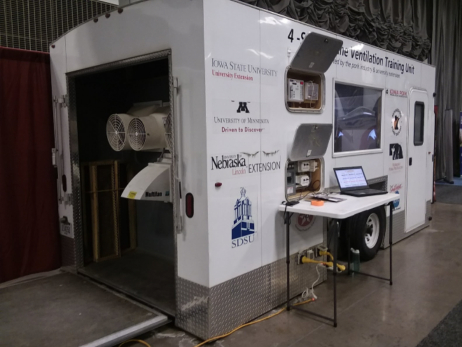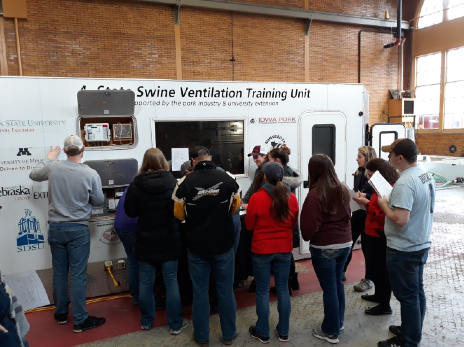The following activities, resources and organizations provide education on designing and managing the environments for livestock and poultry production. This includes the environment inside and external to barns.
More information is also available on UMN Extension pages for Swine, Dairy, Poultry biosecurity, Manure management.
Erin Cortus and Kevin Janni work with collaborators in Minnesota and across the U.S. to support the following programs and resources.
Minnkota Agri-Builders and Suppliers Association
Minnkota is an organization that provides technical education to stakeholders such as builders, equipment suppliers, government agency representatives, and consultants, who design, build, and use animal production facilities in the upper Midwest region (MN, ND, SD, NE, IA).
Erin Cortus and Kevin Janni are the University of Minnesota coordinators for this association.
The 2021 annual meetings were held as series of four "Lunch and Learn" webinars that took place between March and April, 2021.
The 2022 Annual Meeting details are to be determined.
Ventilation Workshops and Trailer
“Managing Your Unseen Employee” ventilation workshops review and explore ventilation management for your operation. Workshop topics include:
- Controller settings
- Pressure
- Air speed
- Inlets
- Heaters
- Troubleshooting
Workshop material can be tailored for wean-finish, sow, and/or farrow-finish swine operations, or for poultry and cattle systems.
The Four-State Ventilation Trailer is available to practice ventilation management and troubleshooting. The trailer includes a control system, various inlet types, and multiple fans.
The trailer and ventilation workshops bring education to your area, while protecting biosecurity.
The trailer and workshops are provided by Specialists from the University of Minnesota and surrounding states. For more information, contact Erin Cortus, [email protected].
Initial funding for the trailer provided by the Minnesota Pork Producers, South Dakota Pork Producers, Nebraska Pork Producers, and Iowa Pork Producers.
Biosecure Entry Education Trailer
The BEET and associated educational programs are adaptable for training on the various formats of biosecure entry to livestock and poultry facilities. The trailer brings education to your area, while protecting biosecurity.
Owners and managers need to decide which practices fit their management needs.
Employees need training to know how to properly carry out Danish entry plans.
Managers responsible for making biosecurity plans can use the trailer to practice their plans for entry into poultry barns based on Danish entry concepts. Employees expected to carry out biosecurity plans can use the trailer to practice company plans and deal with unusual situations that may come up.
The BEET trailer is mobile and available for training purposes on-site, statewide.
For more information, contact Abby Schuft ([email protected]).
Initial funding for the trailer came from the Rapid Agricultural Response program.
Odor From Feedlots Setback Estimation Tool
OFFSET is a calculator to estimate the distance odor will travel around livestock facilities. This tool resulted from many years of data collection around Minnesota.
For access to OFFSET and more information, visit the UMN Extension Air and Water Quality page.
Additional Resources
MidWest Plan Service
MWPS is a university-based publishing cooperative dedicated to distributing research-based and peer-reviewed publications that support the outreach missions of the North Central Region land-grant universities.
Publications are available through the Iowa State University website.
Livestock and Poultry Environmental Learning Community
The LPELC is a community of professionals from across the U.S. (and Canada) with an interest and expertise in animal agriculture and environmental stewardship. The network provides online educational content, a monthly webinar series, and a conference called Waste to Worth.
For more information visit the LPELC's page.

